AI will drive storage needs by 2x over next three years, according to survey funded by Seagate
The adoption of AI is driving explosive growth in data generation over the coming years. As available on-premise storage may not be enough for data generated by AI, cloud-based storage emerging as the top choice for businesses across industries, according to a global survey by Recon Analytics that was ordered and paid for by Seagate. According to the survey, storage demands will increase 2x in the next three years.
More data, more storage, more security
AI adoption is widespread, according to the survey, with 72% of surveyed businesses already using the technology and 28% planning to adopt it within three years. Cloud storage has emerged as the preferred medium for handling AI-driven data growth, with 65% of AI-related data stored in the cloud in 2024, projected to increase to 69% by 2028, according to the survey.
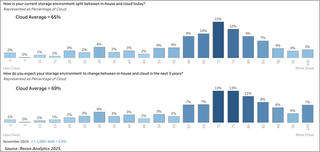
When it comes to storage capacity, it gets quite interesting: Among organizations using over 100PB of storage, 87% save AI training checkpoints in either cloud environments or a combination of hard drives and solid-state drives. Frequent checkpointing is common, with 28% of companies saving daily and 43% saving weekly, which adds to the rising demand for storage, the report says.
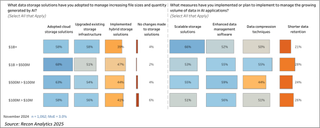
Businesses are also prioritizing longer retention of AI training data, which is considered as essential for improving model accuracy, according to the survey. A significant 90% of respondents believe that extended retention periods lead to better AI outcomes. Companies storing daily checkpoints indicated that 32% retain this data for over 12 months, while 29% retain it for six to 12 months. This focus on data longevity reflects the increasing importance of historical data in refining AI models.
When it comes to infrastructure priorities, security ranks as the most critical component, with 25% of respondents placing it at the top of their list. Meanwhile, storage capacity trails at 18%. Other notable infrastructure concerns include data management, computing resources, network capacity, and regulatory compliance.
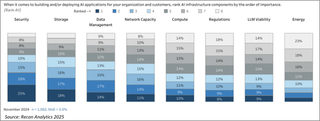
It’s all about scale
Companies are also actively adapting to the growing storage demands brought on by AI adoption. Among the measures taken, 61% have adopted scalable cloud storage solutions, 56% have implemented advanced data management software, and 55% have upgraded their existing infrastructure. Additionally, 49% are leveraging data compression techniques to manage the increasing volume of AI-generated data. These strategies highlight the focus on scalable and efficient solutions to accommodate exponential storage growth.
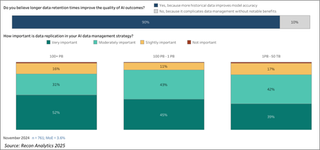
Data replication has emerged as another strategy for ensuring data integrity and optimizing AI outcomes. Approximately 80% of respondents consider replication either very or moderately important for their AI strategies, particularly among organizations with larger storage capacities. Companies using over 100PB of storage are more likely to emphasize replication as critical for maintaining the accuracy and reliability of their AI models.

Looking ahead, cloud storage is expected to dominate as businesses continue shifting operations from on-premises setups to cloud environments. This trend is driven by the scalability, cost efficiency, and convenience of cloud-based solutions.
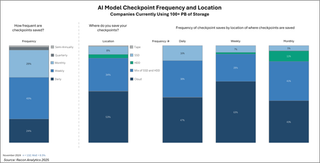
As AI adoption becomes more pervasive, storage requirements are anticipated to grow exponentially as companies transition from trial phases to full-scale implementations. Frequent checkpointing, longer data retention, and replication practices will remain essential, underscoring the need for robust storage infrastructure and advanced management tools to support the future of AI-driven operations.
#drive #storage #years #survey #funded #Seagate
